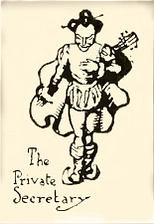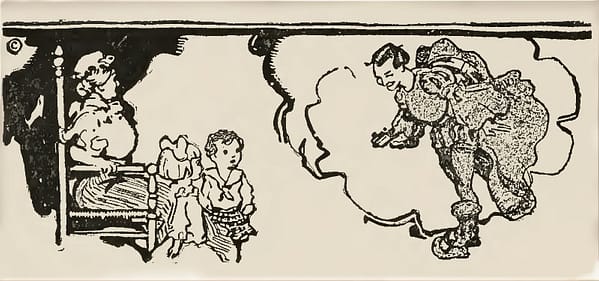So badly did the Widow Pickle feel over the peculiar color of her Twins’ hair that for a long time she forgot to obey her husband’s last wish and look in the cupboard. At last, however, she bethought herself of this request and hastened to the place where Aurelius Pickle had kept his Chemical Substances.
She found several strange-looking boxes, with all sorts of powders and pastes in them, but with no names on the backs to tell what were their contents. She feared to make any experiments, lest she might stain her own hair either blue or green or some other unfashionable color; so all she could do was to look and wonder what was in the boxes. After several days, she concluded to mix some different powders together. She took one small box with a red cover and another that had a black cover, and, pouring small portions of the powder from each of these on a plate, she began to stir the two together.
Nothing happened for some moments. “Chemistry is rather hard, after all,” said the Widow Pickle to herself. “I thought that all there was to it was stirring things together. I formerly noticed that when my poor dear husband did that, something nearly always happened.”
At last, disappointed that nothing had happened, she went to the match-box. “Perhaps,” said she, “if I touch a match to it something will happen.” She did so, and, to her great surprise, something did happen, and that at once.
A cloud of heavy vapor filled the room, and as it cleared away the Widow Pickle saw standing there, bowing and smiling very pleasantly, a little dark man, whom at first she took to be a Japanese. He had black hair, rolled very tight on the top of his head; small feet, incased in boots with long up-turned toes; and a loose flowing mantle of red satin. His hands were small, and his little black eyes twinkled merrily.
“Madam, I believe you have sent for me,” he remarked.
“Indeed, I did not,” said the Widow Pickle. “Moreover, I don’t know who you are. Whence do you come, sir, and why do you intrude without invitation?”
“Who should I be,” said the little man, still smiling pleasantly, “but the Private Secretary and Court Musician of the royal monarch of the Island, the King of Gee-Whiz?”
“The King of Gee-Whiz?” said the Widow Pickle. “I never heard of such a person.”
“Then, madam,” replied the little man sternly, “grant me leave to tell you that you must be an extraordinarily ignorant person. Every one of consequence knows of his Royal Highness, who rules our Island.”
“And, pray, what do you have in your Island, little man?” asked the Widow Pickle scornfully.
“Many things,” replied the strange little man, “more than I should like to tell you all at once.”
“Gold, perhaps?” asked the Widow.
“I believe it is called gold—a very common metal, indeed.”
“Pray, then, what do you use for rings?” asked the Widow, hiding her hands under her apron.
“We usually make them out of our smaller diamonds,” replied the little man carelessly. “There are, however, more precious stones. For instance, there is Lapis Malazite, a very fashionable blue gem; and Lapis Corazine, an emerald-green jewel. Blue and green, madam, are our favorite colors.”
“How strange!” exclaimed the Widow Pickle. And then she told of the manner in which the hair of her Twins had been permanently colored by some of her husband’s Chemical Substances.
“That is very singular,” said the little man. “All I can say is that if their hair is the real malazite blue and the correct corazine green, they could have anything they like in the Land of Gee-Whiz; for these are the Royal Hereditary Colors. But, really, I must be going. I rarely ever stay away more than an hour at a time.”

As he spoke, he stepped toward the window, but in doing so he gave his mantle a slight twitch to one side. As he did this, he displayed to the curious gaze of the Widow Pickle a strangely-carved Banjo, whose supporting ribbon was swung over his shoulders. The Banjo was of ivory and gold, and the pegs for tightening the strings were of shining gold.
“Stay!” cried the Widow. “I have never seen so beautiful an instrument as that. I am sure you play it well; and as for me, I dote upon the banjo.”
“Madam,” smiled the little man, “I see your taste is excellent.”
